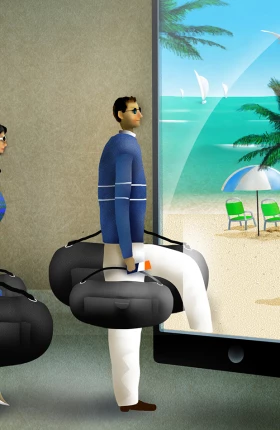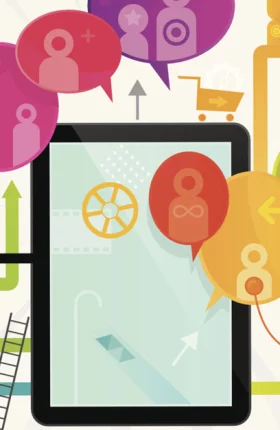The combination of increased digital consumption and mobile technology is having a big impact on the travel industry. A recent report coauthored by The Boston Consulting Group and Facebook, Travel Goes Mobile , details the challenges faced by travel companies, suppliers, and intermediaries. Two of the report’s coauthors, Jason Guggenheim, a BCG partner, and Lee McCabe, global head of travel strategy for Facebook, recently discussed in more detail how digital and mobile technologies are reshaping the travel journey.
Since joining Facebook in 2012, McCabe has led the company’s development and implementation of a comprehensive strategy for working with the travel industry, including travel marketers. He works closely with his travel-industry counterparts to set the course for how travel companies best leverage the world’s largest digital network as a marketing platform. Prior to joining Facebook, Lee held a number of senior roles at Expedia. He oversaw and managed hotel partner strategy and operations across several regions including North America and Asia-Pacific. He has also held sales and marketing positions at eBay, Telstra, and Warner Music Group. Lee has an MA in media from Sheffield Hallam University and an MBA from Warwick Business School.
Lee, as head of travel at one of the world’s leading digital companies, what do you see as some of the critical dynamics influencing the landscape and consumer behavior in the travel sector?
There are several that will impact both the near and the long term. First, travel is very personal to people, and it is now infinitely shareable through digital technology. Not only is there a dramatic rise in connectivity all along the travel journey but also, now, when you add large, people-based platforms such as Facebook to the dynamic, travelers can have more personalized, more valuable experiences during every phase of the journey. From becoming inspired and dreaming about where to go—based on an ad, a post, or a picture—to planning, booking, experiencing, reflecting, sharing, and so forth, travelers find that digital enhances all of these experiences. This is very powerful from a business standpoint, as well as for the more than 1 billion people who use our platform. This all bodes well for travelers, travel marketers, and the entire travel industry.
What’s fascinating is that not too long ago, sharing pictures, reviews, and feedback was possible only as a postjourney activity. Now, you can share all manner of experiences almost instantaneously. Combine this with the fact that people spend more time online than ever before, and the ability of tourism authorities, online travel agents (OTAs), and suppliers to reach people where they are spending their time has never been greater. Good marketing has always been about becoming what matters to people—relevance is another way to think about it—and reaching the right people with the right message at the right time.
Second, mobile and mobile apps. Mobile has been the major disrupter, particularly in the last couple of years. Mobile is at the heart of Facebook, and we are a mobile-first company. When people are on their phones, they are also on Facebook, scrolling through the News Feed, discovering what matters to them. In fact, one in five minutes spent on mobile devices in the U.S. is spent on a Facebook property. Given the intersection of mobile usage and the personal nature of travel, Facebook’s large ad format and creative canvas make it prime digital and ad real estate for hotels, airlines, OTAs, and other travel companies.
Third, the rise in mobile makes the proliferation of apps ever more critical. No question that digital usage is shifting away from desktop and laptop to mobile—and specifically to mobile apps. When people use mobile devices, they’re using apps, which means the influence of Web-based searching will continue to decrease. We are moving from a world of the Web to a world of apps. Again, this is good for users: apps, when they are designed well, are quick and easy. And it’s good for marketers too. The proliferation of devices and mobile apps allows for huge gains in efficiency and direct-sales conversion. Apps also serve as huge drivers of loyalty because they provide constant lines of communication with your already-engaged customers.
Describe how this shift to apps will change the industry.
Sure. As travel companies develop better apps, bookings will follow. PhoCusWright predicts that by 2015, 12 percent of all U.S. travel bookings will be made with mobile devices. Some 86 percent of mobile usage is with apps, as opposed to the mobile Web. This presents travel companies with tremendous opportunity, especially considering that the average person will maintain only a few travel apps on his or her devices. It’s imperative for any travel company to develop good apps and invest in getting them installed on as much mobile real estate as possible. The future of travel is mobile apps. We haven’t seen a shift like this in 15 years. Travel companies need to take advantage of this opportunity. First-mover advantage counts. But with more than 900,000 apps in Apple’s App Store and more than 1 million in the Google Play store, travel companies need to do more than just build a good app and hope people will use it. Driving traffic to that app is imperative.
This is where technology like Facebook app install comes into play. Our mobile-app-install capability enables businesses to reach people on their devices—both Android and iOS smartphones and tablets, for example—and to drive downloads of a company’s app to those devices. OTAs and suppliers can engage customers with one of their apps and then reengage them by prompting people to return to that app. Suppliers have found tremendous success using this. In fact, HotelTonight experienced click-to-install rates that were ten times higher than response rates to traditional banner ads. Clients who have used mobile reengagement are seeing streamlined performance and higher lifetime value from their customers. It’s very exciting to think that this technology and targeting will only continue to improve over time.
As mobile usage evolves, what are travel companies doing to capitalize on it?
Successful players are adapting faster than their competitors. They increasingly invest in digital and bring innovation—new functionalities in their mobile apps, for example—to market earlier. This usually means shifting investments from traditional marketing channels to digital. Many marketers fear that moving dollars from television or print will decrease the efficacy of those channels. But companies that make the move find repeatedly that allocating more resources to digital augments other channels and drives higher impact across all channels. There’s a good reason for this. Large, people-based platforms rich in data empower businesses to deliver personalized messages at scale. Digital marketing is data driven. This means, as I said earlier, reaching the right person with the right message at the right time. This is, and will continue to be, the key to having a presence at every stage of the consumer journey, particularly under the aforementioned premise that good marketing has always been about becoming what matters to people.
It’s worth noting that some of the most successful brands are shifting their organization structure to maximize for efficiency and avoid contradictory or duplicative messages. They are breaking down organizational silos and making digital integral to their sales, communication, marketing, and loyalty functions. This means no longer having “social” departments or titles.
Smart companies also measure what matters. One common mistake is to focus on metrics that aren’t connected to your business. Tracking, for example, “fans” or “followers” often means focusing on social for social’s sake. But social isn’t a business objective. Traditional marketing objectives such as awareness, targeting, sales, and conversion work incredibly well on Facebook, which has more than 1.28 billion people using the platform worldwide and more than 1 billion people per month doing so on mobile devices. This, combined with our vastly rich data, allows for highly effective targeting in ways that do not impinge on privacy. In fact, Facebook offers 89 percent accuracy for narrowly targeted campaigns versus the industry average of 38 percent, according to Nielsen.
We’ve been reading a lot about big data, another technology trend. How do you see Facebook taking advantage of big data to benefit consumers and travel providers?
Adding big data to already sophisticated digital media and personalized targeting at scale only improves how, and the degree to which, travel marketers can achieve their longest-held brand- and direct-response-related objectives: inspiration, conversion, and retention. Big data provides travel companies with enormous potential—online and offline—to personalize the travel experience to a degree never before possible. With data based on people’s real identities—not user names, proxies, or e-mail addresses—companies can determine what’s best for any person in context rather than on average. For example, when someone asks, “Where should I stay in New York?” what she means is, “Where should my family and I stay when we’re there next week?” That is the kind of personal question that big data can help answer. To me, big data really just means targeting. It enables travel marketers to move beyond blunt demographics toward more perfectly timed and tailored messages. That’s a remarkable value proposition for people and for marketers.
Big data, by the way, should mean using your data in combination with third-party data to your advantage. This is often a missed opportunity. Marketers can reach a wealth of new and potential customers on the basis of their interests and prior behavior within an app. For example, by using Facebook’s Custom Audiences or Lookalike Audiences, an OTA can take any segment of its existing customer database and pair it—in a privacy-safe way—with Facebook’s data or a third party’s data to find audiences that are similar to their current customers. In addition to increased efficiency and significant return-on-investment gains, these types of capabilities also create highly adaptable systems for connecting with people throughout the customer life cycle.
Looking out five or more years, how do you see new technologies such as wearables, virtual reality, and artificial intelligence affecting travel?
We’re really excited about these technologies and how they will continue to improve people’s experiences online and offline. I’m not in the predictions business, but what I do know is that people are “always on,” and that’s not going to change anytime soon. I do think it’s a safe bet to say that a mobile-driven world will be powered by apps, which drive increased brand loyalty and disintermediation. And as we continue to move from a world of the Web to one of apps, the travel-booking paradigm will continue to shift. People will stop browsing 20 or 30 websites in the booking purchase path and will use apps instead. We’re already seeing this shift.
What are your parting words of wisdom for those trying to succeed in a travel sector that’s “gone mobile”?
Consider a mobile strategy as central and integral to your overall strategy. This involves developing a sophisticated app that adds value and convenience to your customers’ experiences, getting that app installed among a wide customer base, and investing in driving app engagement. While most people think of mobile as a technology, it is also a behavior—a consumer behavior. People are on mobile all day, every day, and mobile will be the first truly global technology. Last year, IDC reported that 79 percent of smartphone users keep their phones with them for all but two hours of their waking day. People continue to add to the total time they spend with media as they leverage the power of mobile to remain connected throughout the day to the people and things they care about. The truth is that whether they have brand- or direct-response-related goals, savvy marketers recognize that most people are always on, and successful marketers are capitalizing on this.




